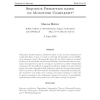35 search results - page 3 / 7 » A Psychogenetic Algorithm for Behavioral Sequence Learning |
125
click to vote
GECCO
2000
Springer
15 years 6 months ago
2000
Springer
This paper describes an evolutionary way to acquire behaviors of a mobile robot for recognizing environments. We have proposed AEM (Action-based Environment Modeling) approach for...
102
Voted
TACAS
2007
Springer
15 years 8 months ago
2007
Springer
This paper is concerned with bridging the gap between requirements, provided as a set of scenarios, and conforming design models. The novel aspect of our approach is to exploit lea...
124
Voted
GECCO
2006
Springer
15 years 6 months ago
2006
Springer
Two mathematical and two computational theories from the field of human and animal learning are combined to produce a more general theory of adaptive behavior. The cornerstone of ...
134
click to vote
COLT
2003
Springer
15 years 7 months ago
2003
Springer
This paper studies sequence prediction based on the monotone Kolmogorov complexity Km=−log m, i.e. based on universal deterministic/one-part MDL. m is extremely close to Solomon...
116
Voted
AI
1998
Springer
15 years 2 months ago
1998
Springer
The absolute loss is the absolute difference between the desired and predicted outcome. This paper demonstrates worst-case upper bounds on the absolute loss for the Perceptron le...

